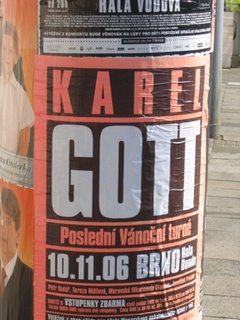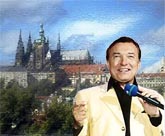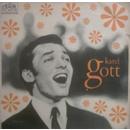Moudrost Gotta
 A few months ago, posters went up that bore a startling revelation: "Karel Gott in his last Christmas tour." Gott is kind of like the Energizer bunny—he just keeps going and going and is never going to stop. Or at least that's what we thought. Who is he? He became famous as a singer decades ago. Musically, he might fall somewhere between Frank Sinatra, Elvis, Nat King Cole, Tony Bennett, and Lawrence Welk; he’s as close as the Czechs get to Ed McMahon and hosted every New Year’s Eve special in known history; now he's also a painter, father, and actor who has that air of an always somewhat seedy but aging star like William Shatner. (Like a certain generation that venerated Captain Kirk as the stunningly handsome, somehow, many seem not to have realized that these things change with time.) However, Gott really is venerated by a substantial fan following, and apparently he’s quite popular in Germany as well. I cannot tell you how absolutely astonished I have been at the number and variety of people who have just lit up when a Karel Gott number happens to come on the radio.
A few months ago, posters went up that bore a startling revelation: "Karel Gott in his last Christmas tour." Gott is kind of like the Energizer bunny—he just keeps going and going and is never going to stop. Or at least that's what we thought. Who is he? He became famous as a singer decades ago. Musically, he might fall somewhere between Frank Sinatra, Elvis, Nat King Cole, Tony Bennett, and Lawrence Welk; he’s as close as the Czechs get to Ed McMahon and hosted every New Year’s Eve special in known history; now he's also a painter, father, and actor who has that air of an always somewhat seedy but aging star like William Shatner. (Like a certain generation that venerated Captain Kirk as the stunningly handsome, somehow, many seem not to have realized that these things change with time.) However, Gott really is venerated by a substantial fan following, and apparently he’s quite popular in Germany as well. I cannot tell you how absolutely astonished I have been at the number and variety of people who have just lit up when a Karel Gott number happens to come on the radio. Apart from the above, there are two more things I think about when I think about Gott. (There is his music, but I’m getting to that. Believe me, it can wait. If you can't wait, listen to a short excerpt here.) First, his 1969 Eurovision attempt. You may be thinking, but Soviet Russia invaded the Czech Republic in 1968, how did it happen? In what is an apparent loophole, Gott represented Austria at the competition in London and he came in second to last. Political divisions made it difficult to watch the competition on television, although apparently some concessions were made. Czech director Jan Němec also made a documentary about the trip called "Waiting for Gott" (Čekání na Gotta) for Czechoslovak Television.* Second, he is an amateur artist and paints calendars and cows. For the Prague Cow Parade in 2004 (an installation of cow statues around the city not a parade of live cows),** his entry was a collage on plastic cow with pictures of Karel Gott (who else?) entitled "No Name Bull." Some crazies even supported him in a bid for president (poster at left).
Apart from the above, there are two more things I think about when I think about Gott. (There is his music, but I’m getting to that. Believe me, it can wait. If you can't wait, listen to a short excerpt here.) First, his 1969 Eurovision attempt. You may be thinking, but Soviet Russia invaded the Czech Republic in 1968, how did it happen? In what is an apparent loophole, Gott represented Austria at the competition in London and he came in second to last. Political divisions made it difficult to watch the competition on television, although apparently some concessions were made. Czech director Jan Němec also made a documentary about the trip called "Waiting for Gott" (Čekání na Gotta) for Czechoslovak Television.* Second, he is an amateur artist and paints calendars and cows. For the Prague Cow Parade in 2004 (an installation of cow statues around the city not a parade of live cows),** his entry was a collage on plastic cow with pictures of Karel Gott (who else?) entitled "No Name Bull." Some crazies even supported him in a bid for president (poster at left).  I was recently listening to Gott’s recording of "Prázdný dům." It was recorded on 18 November 1968, just months after Soviet tanks had rolled into Prague. Given Gott's reputation as a sort of political chameleon (he seems to be loved by everybody who is in power), it's doubtful whether the song, called "The Empty House" in Czech, had any connection in anyone’s mind with that event, but you never know. I also realized that this same song was also recorded by Elvis in 1973 as "She Wears My Ring." The English words were by Boudleaux and Felice Bryant. The melody may have originally come from an Argentinian song about swallows. There are certainly English, French, and Czech versions of the lyrics. The Czech version (lyrics by Jiří Štaidl) talks about birds, but it's much more sadly sentimental than Elvis’s droopy cowboy version.
I was recently listening to Gott’s recording of "Prázdný dům." It was recorded on 18 November 1968, just months after Soviet tanks had rolled into Prague. Given Gott's reputation as a sort of political chameleon (he seems to be loved by everybody who is in power), it's doubtful whether the song, called "The Empty House" in Czech, had any connection in anyone’s mind with that event, but you never know. I also realized that this same song was also recorded by Elvis in 1973 as "She Wears My Ring." The English words were by Boudleaux and Felice Bryant. The melody may have originally come from an Argentinian song about swallows. There are certainly English, French, and Czech versions of the lyrics. The Czech version (lyrics by Jiří Štaidl) talks about birds, but it's much more sadly sentimental than Elvis’s droopy cowboy version.Gott’s version has some similarities with Elvis's. Both have smooth, soupy voices that are strikingly broad and full, and they seem to share a bel canto approach. They’re also both backed up by heavenly choirs and strings, though Gott didn’t enjoy the backing of a honkey-tonk band or a choir with gospel leanings. The differences might be equally striking: Gott’s voice is tighter but very sweet, more like an operatic tenor, and he makes the most of his range;*** Elvis's, on the other hand, is relaxed and loose with the largest and most wide open vowels you can imagine. Elvis tells it like it is, Gott yearns for better times.
For an alternative version, listen to this.
Gott sites: karelgott.com and gott.cz
Other: Got Gott?, Radio Prague, Gott Milk?
*In this discursive footnote, I wonder why, given Němec’s erudite and obscure filmmaking, the title plays on Beckett’s Waiting for Godot. It is near impossible to connect Beckett and Gott.
**In this second discursive footnote, I note that the greatest cow of any cow parade ever is without question "Babushka Marushka the Polka Cow" by artist Jennifer Jastrab from the 2006 Wisconsin Cow Parade.
***Of course, anybody familiar with the sound of Czech dechovka (popular brass band music) might also make the connection between Gott’s vocal timbre and the sound ideal of that sort of brass band music.
Tags: karelgott, czech, music, cowparade
 A graduate student in music and anthropology writing a dissertation about music in Moravia, the eastern third of the Czech Republic. At some point, the Czech Republic's "second city" (that would be Brno) captured my attention, and I've since been blogging about events, arts, music, and other stuff—basically whatever interests me in and around the cityscape. I'm not living in Brno now, but I keep up with the cultural pulse from afar as best I can.
A graduate student in music and anthropology writing a dissertation about music in Moravia, the eastern third of the Czech Republic. At some point, the Czech Republic's "second city" (that would be Brno) captured my attention, and I've since been blogging about events, arts, music, and other stuff—basically whatever interests me in and around the cityscape. I'm not living in Brno now, but I keep up with the cultural pulse from afar as best I can.


Comments:
Excellent.. where did you get most of the research for this post? Radio Prague? The Eurovision bit ties into Czech Idol because they showed the Eurovision clips from Abba's entry into the contest back in '72, I think. Here is a link of Karel Gott searches on YouTube.
11:35 PM, November 25, 2006
Oh my goodness. There are some wonderful clips there! I am always amazed at the richness of YouTube finds. But I did most of the research for this in the liner notes to my Gott 1968 album. I think they're trying to rerelease every single Gott recording.
12:50 AM, November 30, 2006
» Post a Comment